- Home
- Adam Thorpe
Between Each Breath Page 26
Between Each Breath Read online
Page 26
‘That’s what you say each time,’ said Marjorie. ‘Time goes by awfully fast, you know. Look at me. Philip is about to be fifty, for God’s sake.’
‘In three years,’ said Milly, who sounded far away. Jack glanced at her out of the corner of his eye, keeping his head in that twisted position like a jazz player, crouched low over the keyboard. When he let the silence come through under la résonance, it was filled by all the clocks in the house and their antique movements, from the grandfathers to the little ormolus, keeping Wadhampton Hall time, which was the time of woods and dynasties stretching back to a mailed glove around the throat of a Saxon serf.
‘He’s been nearly fifty for as long as I can remember,’ said Marjorie, who disapproved of Philip and was disapproved of back. ‘Right from birth, probably. Awfully large baby.’
Jack was desperate to avoid a bad atmosphere, and pumped the room with his ambient chilling-out sound as discreetly as he could.
‘This your latest reading?’ asked Milly, picking up a book on the little Indian table next to her chair. It was a hardback book called Politics, by Adam Thirlwell. Marjorie’s eyes twinkled.
‘Richard thinks it’s all about Westminster, don’t you, darling?’
‘Talking of which,’ said Richard, ‘somebody on the wireless had a most interesting anecdote. Did you hear it, Jack?’
‘Which one?’ said Jack, slightly annoyed that a subtle shift from D minor to G could go so unnoticed, trampled under Daddy du Crane’s strong tenor voice. One of his eyebrows was wonky after a riding accident; it made him look permanently quizzical.
‘Some judge condemned a whole load of Luddites to hang for some minor misdemeanour, and he was asked if it was right to hang so many chaps from one beam.’
‘Does this go on and on?’ asked Marjorie, helping herself to the brandy.
‘And the judge thought about it for a while, you see, and then he said – hang on, let me get this right –’
‘Here we go,’ said Marjorie. ‘You talk about me! How’s your friend Sally, Milly?’
‘Sammy, you mean? Sammy Carlisle? Let Daddy finish. She’s fine,’ Milly added, all but mouthing it and tucking her legs up under her on the creaking rattan wing chair.
‘The judge said, “You’re right. Maybe they’d be more comfortable on two!” Isn’t that marvellous? Two beams.’
‘They were awful in those days,’ said Milly, vaguely.
‘I thought it was marvellous!’
‘You always do,’ said Marjorie, drawing a hand over her eyes as if there was some phantom lock of hair there from her wild youth.
‘I hope you don’t think what he said was marvellous,’ said Milly, frowning gently at her father. ‘That’s really off-piste, if so.’
‘What I think is neither here nor there,’ said her father. ‘It’s history.’
Jack was pressing the chords out and looking forward to going to bed with Milly. He found her sexier in Wadhampton Hall, whose lawns she ran about on as a little girl, whose tennis court (a lumpy grass one from the twenties) she bounced about on through summers on holiday from Roedean, dressed in a fetching Chris Evert-type skirt (he’d seen the snaps). He was looking forward to her climbing on top and grinding away with her usual passion and intensity, massaging her own breasts.
Because now, a fortnight after disappointment, it was the green light for tricks, she’d said.
‘Mummy, what is this?’ Milly was reading the hardback novel in her lap. She sounded shocked.
‘Some like it hot, as we used to say,’ said Marjorie, taking a large sip of her brandy and winking over it. ‘Pink woolly handcuffs.’
Jack had heard of the novel ages ago and was embarrassed that Milly hadn’t. He hardly ever read novels, aside from Kafka and so on – he preferred books about history and myth – but at least he tried to keep up with names. Milly was too busy to read reviews, let alone novels; she had so much green save-the-world stuff to wade through.
‘Do you know,’ said Milly, turning the pages, ‘despite computers, or because of computers, we use twice the amount of paper compared to ten years ago?’
‘Romans wrote on birch bark,’ said Richard, expanding his chest and sighing. His face was very red in the low light.
‘How many does Sally have now?’ asked Marjorie.
‘Can’t keep count,’ said Milly. ‘Five, actually’
‘There’s so much they can do these days,’ said Marjorie.
‘Mother-in-law,’ said Jack, in a laid-back American way that went with the vibes he was coaxing out, ‘let’s give that subject a break, huh?’
‘I’ll say it one more time, Mummy,’ said Milly, in her clipped, office tone that Jack didn’t like. ‘We are not fiddling about with unnatural procedures and pumping me with chemicals just in order to please ourselves and, by the way, increase the burden of the planet with yet another human being to support. OK?’
‘I’m glad I don’t look at life like you do, my darling,’ said Marjorie, gazing through the French windows into the night’s murmuring blackness.
‘I’m getting bitten,’ said Richard, scratching his ankles.
‘We don’t have to have lights on,’ said Marjorie. ‘It’s not really dark out there at all. It’s only the lights in here that make it look dark. I think,’ she continued, after a tiny pause, ‘that I’d have painted like early Picasso. What a funny thought.’
‘And now?’ asked Jack, quoting subtly from Orlando Gibbons, the chords ebbing and flowing under his hands in F sharp minor.
‘Frank Auerbach,’ she said, without hesitation, then wiped her lips with her arthritic forefinger.
‘Wow,’ said Jack.
‘Frank who?’ asked Milly.
‘Oh, you must know Auerbach. I thought you went to Oxford.’
‘You know I haven’t the faintest how I got in,’ said Milly, pulling a face.
‘We’re all like that,’ Richard commented, ambiguously, his voice hollowed out by the big brandy balloon as he tipped it, nestling in the fumes.
‘Milly’s always saying she’s thick,’ said Jack, without quite knowing why.
‘She was keen on dancing as a little girl,’ said Marjorie. ‘Danced away on the lawn. By the way, Richard, Tony went on and on about the gooseberries. Something about pruning the new shoots in summer. We’re summer now, aren’t we? How’s your poor mother, Jack? How awful not to see.’
‘When?’ asked Richard.
‘She’s bearing up,’ said Jack.
‘Now, you big oaf.’
‘I know nothing about gooseberries except that I like them in fool. Can’t he just do whatever he thinks right?’
‘No one ever does,’ said Marjorie, laying her head back against the cushion and closing her eyes. ‘No one seems to have heard of foam flowers, these days. That’s because they’re small and not showy. Yet they were all the rage when I was a child.’
Jack allowed the last chords to purr to an end.
‘Oh, thank goodness,’ sighed Marjorie. ‘It did go on and on.’
In bed that night, the rocking horse’s one good eye catching the moonlight from the thinly curtained window, Jack was finding it hard to sleep, worked up not by Milly’s body (which she had kept him from touching in any meaningful way, being too stressed out), but by her mind. She had gone on and on about her parents in a fierce whisper (the house was too complicated, with too many hidden passages and ducts, to trust one’s privacy to): they were, she reckoned, incredibly annoying and selfish. Particularly her mother. Milly had hardly ever talked about her parents like this; Jack was afraid she might cut herself off from them, like her younger and never-mentioned brother Benedict who had last been spotted on a beach somewhere in Goa more than a year ago, with a limp from a motorcycle crash in Sydney two years earlier.
Jack liked coming to Wadhampton Hall, it inspired him and amused him in some way, it made him feel placed. In fact, he couldn’t bear the thought of Philip taking over: Philip du Crane was a tall, tight-arsed City bas
tard who drove a four-by-four as big as a snowplough and regarded Jack as one might a smear of dogshit on one’s very expensive shoe, and had frequently expressed his desire to get Wadhampton Hall earning. There were dark rumours of turning it into a business conference centre, but his father dismissed these as Milly’s paranoia: Richard admired his son for being the first du Crane since Edmund du Crane, a Tory minister in the 1830s, to actually live a real, wage-earning existence. Milly, apparently, didn’t count.
Whatever, Jack very much doubted that life at Wadhampton Hall under the reign of Philip would be anything but unpleasant for the Middletons, and so wished as long a life as possible for Richard and Marjorie. No one had considered which twin might inherit from Philip, although technically it was Lance by about ten minutes. Poor Rex, again.
Milly was annoyed with her mother, mostly, for going on about children, and with her father for not getting involved. Underneath it all, of course, was Milly’s abiding grief and sense of failure. She sat up against the pillows and complained, her new silk nightie falling away from her breasts just enough in the moonlight to entice. He put on his most compassionate tone, a kind of vocal soft jazz, while very much wanting to bury his nose in her.
‘They won’t even agree to putting up a bloody yurt in the grounds,’ said Milly. ‘They think it’ll attract hippy travellers. They’re so Tory.’
‘Well, I guess it’s their grounds,’ said Jack, unhelpfully.
‘Philip’s soon,’ she said. ‘To escape death duties.’
‘Oh, then they’d better get the yurt for themselves.’
‘He can’t chuck them out,’ she pointed out. ‘Only once they’re dead.’
Jack laughed at Milly’s accidental joke and the high bed-end wobbled. Its wood was thick, dark, wormholed and carved with late fifteenth-century flower and fish motifs. Men, women and children must have died in this bed – pestilence, pox, whatever. It creaked every time they moved. One TV crew had used it for a murder scene in an Edgar Allan Poe adaptation. Milly got born in it – a fact which Jack liked to dwell on only in the abstract – with Richard du Crane pacing up and down in the main bedroom, a tall young man who had in turn been born in the same bed three decades earlier. It was, Jack thought, like flicking through the leaves of a book. He wished he could think up a more arresting image, but his mind converted it into musical fragments scored for (he frowned, trying to focus on the sounds and the shapes and the scribbles) clarinet, percussion, violin, double bass and girls’ choir. Weird. Mental. Because somewhere in there was the squawk of a lorry’s brakes advancing bit by bit in a traffic jam.
Milly was breathing softly in her sleep and the old rocking horse was eyeing him with a glint, but not moving. If it started to move he would be seriously worried. The faint chimes of midnight hustled through the house over a period of some ten minutes, because (he smiled to himself) the house was so big it had different time zones.
Being that time of night, his situation fell away into three distinct parts: Kaja had turned up in his life again, maybe staking his maybe son; she undoubtedly thought of the maybe father as a lying bastard (though not in so many words); but she was not going to destroy what she had again turned up in, or she’d lose the winnings. The whole thing was framed fine. All he had to keep was his cool. Dialogue, not war.
Echo. Kaja meant echo in Estonian. She was an echo in his life, and he was an echo in hers. But echoes were still solid sound. Her hotel work was probably carried out during antisocial hours. He wondered what she did with Jaan. Maybe a child-minding neighbour took him to and from school. He wondered if she’d ever completed her studies in the end. He could ask her these things when they met. His stomach lurched with apprehension. He hoped it wasn’t anticipation.
The bed-end smelt of countless applications of beeswax and of something deeper and darker, something like smoke, a sootiness: he had rested his hands on it, behind his head, and his skin now had that smell. Maybe the countless fires that had burned in the fireplace since 1627 had been absorbed by the wood of the bed-end. The musical fragments were not cohering, but twisting and turning between his ears. The bed was hurtling along through time – he and Milly were a momentary flicker, soon they’d be dead. No doubt he would be forgotten, an extremely minor composer whose pieces would now and again be revived – assuming the whole culture binge was still in place, or recognisable. No guarantee: eco-disaster would bring about the rule of tyrants, of police states, of religious maniacs. Music would be banned, or military, or purely sacred. Or (even more depressing, because so nearly there already) easy-listening jingle-tingle crap chosen by corporate executives – the greatest, tenderest, most astonishing human gift just squandered, chewed up and compressed into pure product, piped incessantly into every public space. No more thinking songs in the forest, let alone Schubert. Who in fact wrote a lot of crap stuff amid the genius.
Jack was getting himself seriously miserable. The human future looked very, very dark. As Milly had pointed out on the train down, the most powerful men in the world with the most powerful army ever in world history were anti-evolution. That was, like, so insane. Like being anti-tree, she’d said. And everybody else in the carriage was younger than they were – mostly men in suits with thick necks and loud voices bound for Basingstoke and beyond, hooked up to their iPods or mobiles, who really did not look as if they cared a toss either way.
He didn’t think he’d fallen asleep, because he wasn’t conscious of having woken up, but there was a woman standing by the window.
Milly? No, Milly was right there beside him, mouth open.
The woman seemed to have a wind-billowing tent for a dress and something on her head, but she was in silhouette and the moonlight behind her was dimmer, now. She was crying. He couldn’t hear her crying, but he knew she was because the whole dark room thrilled with it: the walls were – to put it in the way he was feeling it (almost as a visual thing) – running with her tears. There was nothing he could do: he knew it was a ghost, a spectral presence left over from some far-off time, like a means to an end that never came. He lay there looking at her and absorbing her sorrow. He felt he was helping her, simply by sharing the burden.
On top of everything else, there was something sexual involved; he had been chosen by the spectral woman (he judged her, purely by inward sensation, to be in her twenties), because he was a young, sappy guy.
It was a shock when she floated over to him and revealed herself as Kaja, with slightly larger teeth. With, in fact, very large teeth that appeared to be filed sharp. She was grinning at him and her eyes were stitched on.
He only remembered after he had woken up in a sweat, heart pounding, that he was actually forty-three.
After breakfast he went immediately out to find Graham, who was watching the tiny young groom, Dean, brush Richard du Crane’s chestnut hunter in the stable yard. Jack had never known Graham to do anything other than watch, he realised, yet apparently he was always busy. He almost called him Eeyore. Only Marjorie was allowed to call him that.
‘Graham, can I have a word?’
‘But yes.’
Jack told him about his nightmare in the early hours, in the West Wing bedroom – Milly’s old room. Graham nodded.
‘And so?’
‘What are the vibes in that room, Graham?’
‘Heavy. Lady Margaret, died 1473, is a frequent visitor.’
‘In that room?’
‘Yeah,’ said Graham, as if he’d been asked a stupid question. ‘Gave birth to stillborn triplets the size of mice and died.’
‘Jesus. So that part of the house was not burnt down?’
‘No idea.’
‘But you just said she died in that room in 1473, way before the fire.’
‘So, it’s all cool.’ Graham turned to Dean. ‘You can have a go at my fucking ponytail afterwards, man.’
Dean laughed. His brush was bringing up the chestnut’s flanks to a shine like a conker’s, over the hip bones.
All four of them went
for a walk in the grounds before lunch. It was a dog-leg that took in a very nice pub called the Hen and Chickens on the quiet B-road that bordered the estate for half a mile on the south side. Because Marjorie was slower these days, they took the quicker route, following the wide woodland track that had once been a Roman and then a Saxon thoroughfare, and was now used only by the local hunt, of which Richard was the titulary Master.
‘We’ve had trouble with these Right to Roam people,’ said Richard. ‘They’re even worse than the Ramblers’ Association types with their awful hair and anoraks. I’m convinced some of them are saboteurs, like the whole bloody government.’
Richard du Crane had gone down to London and waved a placard against the Countryside Act – the only demo he’d ever attended.
‘You can see their point,’ said Milly.
‘They’ve got a footpath! It was all settled years ago! In the eighties!’
‘One footpath that goes through one end of a huge splodge of thousands of acres.’
‘Don’t call it a splodge, Milly. It’s not a splodge,’ said Richard, who was crusty this morning. He often was on a Sunday.
‘Sorry. The olde oaken heart of England!’ she cried, with an American or possibly Hampshire twang.
‘They do tend to leave their clutter,’ said Marjorie.
‘You could put up a sign, or a litter bin,’ suggested Jack, although he didn’t like the idea at all. Secretly, he wanted the whole of the estate to be totally private, but he would never say that out loud.
‘Think they can read?’ said Richard.
‘Daddy, if you could hear yourself,’ said Milly. ‘You’re such an old fascist.’
‘A tosspot, not a fascist,’ said Marjorie.
‘Feathers,’ said Richard, pointing to a downy heap of them on the rim of a rut, as if no more need be said.
‘Fox,’Jack commented, needlessly, and because no one agreed or disagreed, the word hung embarrassingly in the air. ‘I once saw a fox kept in a cage for years,’ he said, without thinking. ‘I wish I’d let it out.’
‘That was a dream, or so you told me,’ said Milly.

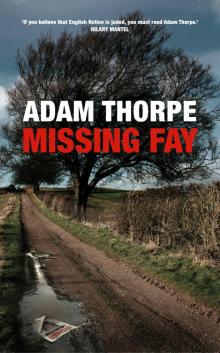 Missing Fay
Missing Fay Hodd
Hodd Pieces of Light
Pieces of Light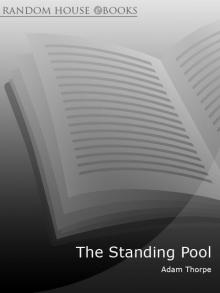 The Standing Pool
The Standing Pool Ulverton
Ulverton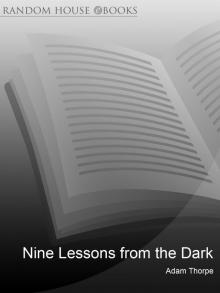 Nine Lessons From the Dark
Nine Lessons From the Dark Flight
Flight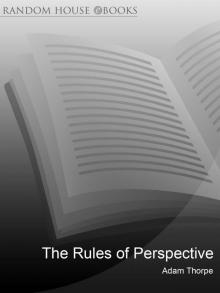 The Rules of Perspective
The Rules of Perspective From the Neanderthal
From the Neanderthal Is This the Way You Said?
Is This the Way You Said?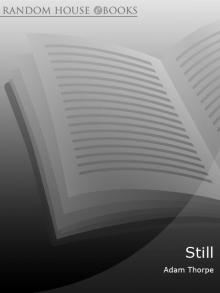 Still
Still No Telling
No Telling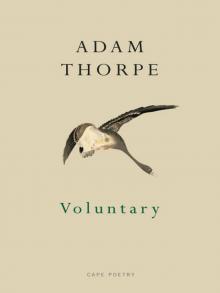 Voluntary
Voluntary Between Each Breath
Between Each Breath